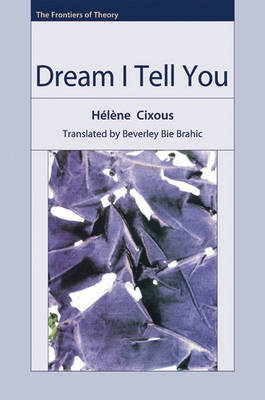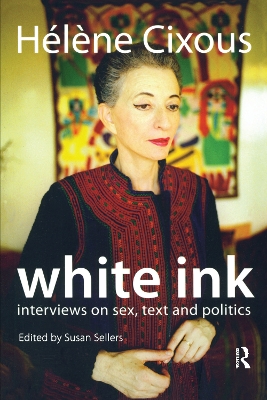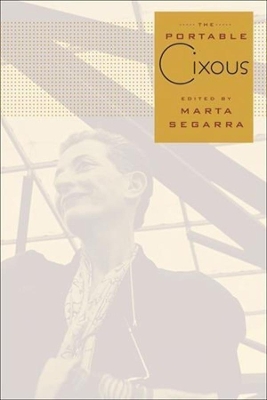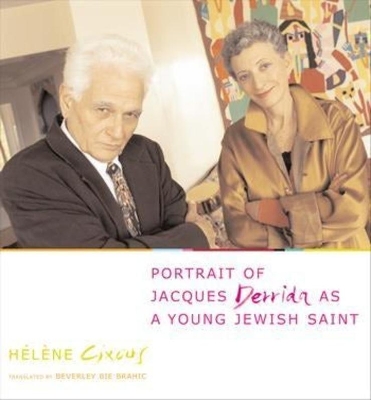European Perspectives: A Series in Social Thought and Cultural Criticism
4 total works
An account of, and commentary on, a collection of dreams by this much admired French novelist, playwright and theorist. The dream is both a rich poetic tapestry and a key document in understanding Cixous' writing practice. The 'You' of the title is Jacques Derrida to whom it is recounted. The book then embarks on a deconstruction of psychoanalysis, the field of fiction and literary production, subjectivity, sexual difference, and the question of friendship. Derrida's response to "Dream I Tell You" is his book Genius, Genealogies, Genres and the Genie, also to be published by Edinburgh University Press in The Frontiers of Theory series. This series brings together internationally respected figures to comment on and re-describe the state of theory in the twenty-first century. It takes stock of an ever-expanding field of knowledge and opens up possible new modes of inquiry within it, identifying new theoretical pathways, innovative thinking and productive motifs.
Helene Cixous is widely regarded as one of the world's most influential feminist writers and thinkers. "White Ink" brings together her most revealing interviews, available in English for the first time. Spanning over four decades and including a new interview with the editor Susan Sellers, this collection presents a brilliant, running commentary on the subjects at the heart of Cixous' writing. Here, Cixous discusses her books and her creative process, her views on and insights into literature, philosophy, theatre, politics, aesthetics, faith and ethics, human relations and the state of the world.As she responds to interviewers' questions, Cixous is prompted to reflect on her roles and activities as poet, playwright, feminist theorist, professor of literature, philosopher, woman, Jew. Each interview is a remarkable performance, an event in language and thought where Cixous' celebrated intellectual and poetic force can be witnessed 'in action'. The accessibility of the interview format provides an excellent starting-point for readers new to Cixous, while those already familiar with her work will find unexpected insights and fresh elucidations of her thought.
Helene Cixous is more than an influential theorist. She is also a groundbreaking author and playwright. Combining an idiosyncratic mix of autobiographical and fictional narrative with a host of philosophical and poetic observations, Cixous's writing matches the kaleidoscopic nature of her thought, offering new ways of conceptualizing sex, relationships, identity, and the self, among other topics. Yet, as Jacques Derrida once observed, a "profound misunderstanding" hangs over the accomplishments of Cixous, with many believing the intellectual excelled only at theoretical exploration. Providing a truly liberal selection of her writings from throughout her career, Marta Segarra rediscovers Cixous's acts of invention for a new generation to enjoy. Divided into thematic concerns, these works fully capture Cixous's genius for merging fiction, theory, and the experience of living. They discuss dreaming in the feminine, Algeria and Germany, love and the other, the animal, Derrida, and the theater. They defy classification, locking literature, philosophy, and psychoanalysis into thrilling new patterns of engagement.
Whether readers are familiar with Cixous or are approaching her thought for the first time, all will find fresh perspectives on gender, fiction, drama, philosophy, religion, and the postcolonial.
Whether readers are familiar with Cixous or are approaching her thought for the first time, all will find fresh perspectives on gender, fiction, drama, philosophy, religion, and the postcolonial.
Who can say "I am Jewish?" What does "Jew" mean? What especially does it mean for Jacques Derrida, founder of deconstruction, scoffer at boundaries and fixed identities, explorer of the indeterminate and undecidable? In Portrait of Jacques Derrida as a Young Jewish Saint, French feminist philosopher Helene Cixous follows the intertwined threads of Jewishness and non-Jewishness that play through the life and works of one of the greatest living philosophers. Cixous is a lifelong friend of Derrida. They both grew up as French Jews in Algeria and share a "belonging constituted of exclusion and nonbelonging"-not Algerian, rejected by France, their Jewishness concealed or acculturated. In Derrida's family "one never said 'circumcision'but 'baptism,'not 'Bar Mitzvah'but 'communion.'" Judaism cloaked in Catholicism is one example of the undecidability of identity that influenced the thinker whom Cixous calls a "Jewish Saint." An intellectual contemporary of Derrida, Cixous's ideas on writing have an affinity with his philosophy of deconstruction, which sought to overturn binary oppositions-such as man/woman, or Jew/non-Jew-and blur boundaries of exclusion inherent in Western thought.
In portraying Derrida, Cixous uses metonymy, alliteration, rhyme, neologisms, and puns to keep the text in constant motion, freeing language from any rigidity of meaning. In this way she writes a portrait of "Derrida in flight," slipping from one appearance to the next, unable to be fixed in one spot, yet encompassing each point he passes. From the circumcision act to family relationships, through Derrida's works to those of Celan, Rousseau, and Beaumarchais, Cixous effortlessly merges biography and textual commentary in this playful portrait of the man, his works, and being (or not being) Jewish.
In portraying Derrida, Cixous uses metonymy, alliteration, rhyme, neologisms, and puns to keep the text in constant motion, freeing language from any rigidity of meaning. In this way she writes a portrait of "Derrida in flight," slipping from one appearance to the next, unable to be fixed in one spot, yet encompassing each point he passes. From the circumcision act to family relationships, through Derrida's works to those of Celan, Rousseau, and Beaumarchais, Cixous effortlessly merges biography and textual commentary in this playful portrait of the man, his works, and being (or not being) Jewish.



